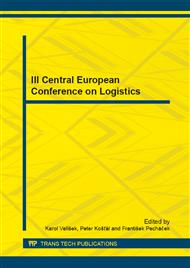[1]
W. Shena, Q. Haoa, H. Yoona and D. Norrie. Applications of agent-based systems in intelligent manufacturing: An updated review. Advanced Engineering Informatics, 20(4) (2006) 415–431.
DOI: 10.1016/j.aei.2006.05.004
Google Scholar
[2]
J. M. Swaminathan, S.F. Smith and N.M. Sadeh. Modeling Supply Chain Dynamics: A Multiagent Approach. Decision Sciences, Volume 29 Number 3, Summer (1998). pp.607-632.
DOI: 10.1111/j.1540-5915.1998.tb01356.x
Google Scholar
[3]
W.E. Walsh and M.P. Wellman. Modeling supply chain formation in multiagent systems. In: Agent Mediated Electronic Commerce (IJCAI Workshop). (1999) 94–101.
DOI: 10.1007/10720026_5
Google Scholar
[4]
Y. Chen, Y. Peng, T. Finin, Y. Labrou, S. Cost, B. Chu, J. Yao, R. Sun and B Wilhelm. A negotiation based multi agent system for supply chain. In: Working Notes of the Agents '99 Workshop on Agents for Electronic Commerce and Managing the Internet-Enabled Supply Chain, Seattle, WA. April (1999).
Google Scholar
[5]
W. Shen, M. Ulieru, D. Norrie and R. Kremer. Implementing the internet enabled supply chain through a collaborative agent system. In: Proceedings of Agents '99 Workshop on Agent Based Decision-Support for Managing the Internet- Enabled Supply-Chain, Seattle, May (1999).
DOI: 10.1117/12.411771
Google Scholar
[6]
N. Sadeh, D.W. Hildum, D. Kjenstad, and A. Tseng. MASCOT: an agent-based architecture for dynamic supply chain creation and coordination in the internet economy. Prod Plan Control, vol. 12(3), (1999) pp: 212–223.
DOI: 10.1080/095372801300107680
Google Scholar
[7]
K. Kim, C. Boyd, J. Paulson, J. Charles and J. Petrie. Agent-based electronic markets for project supply chain. In: Proceedings of the Knowledge-based Electronic Markets, at the AAAI '00 Workshop, July 31, Austin, TX, USA. (2000).
Google Scholar
[8]
S. D. Pathak, G. Nordstrom and S. Kurokawa. Modeling of supply chain: A multi-agent approach. In: Proceeding on IEEE SMC 2000, CD ROM Reference 00ch37166c, Nashville, TN, October 8, (2000).
DOI: 10.1109/icsmc.2000.886417
Google Scholar
[9]
M. He and H-F. Leung. Agents in E-Commerce: State of the art. Knowledge and Information Systems 4 (3), (2002). 257–282.
Google Scholar
[10]
J. Wu, M. Cobzaruo, M. Ulieru and D. H, Norrie. SC-Web- CS: Supply chain web-centric systems. In: Proceedings of the IASTED International Conference on Artificial, Banff, July 24–26, (2000). p.501–507.
Google Scholar
[11]
J. Hendler. Agents and the semantic web. IEEE Intelligent Systems 16 (2), (2001) 30–37.
Google Scholar
[12]
T. Berners-Lee. Axioms, architecture and aspirations. In: W3C All-working Group Plenary Meeting, February 28, (2001).
Google Scholar
[13]
T. Kaihara. Multi-agent based supply chain modeling with dynamic environment. International Journal of Production Economics 85, (2003) 263–269.
DOI: 10.1016/s0925-5273(03)00114-2
Google Scholar
[14]
R. Singh, A. F, Salam, L. Iyer. Agents in e-supply chains. Communications of the ACM 48 (6), (2005)108–115.
DOI: 10.1145/1064830.1064835
Google Scholar
[15]
J. Reaidy, P. Massotte, D. Diep. Comparison of negotiation protocols in dynamic agent-based manufacturing systems. International Journal of Production Economics 99, (2006). 117–130.
DOI: 10.1016/j.ijpe.2004.12.011
Google Scholar
[16]
B. Ezzeddine, B. Abdellatif and B. Mounir. An intelligent framework for the cooperation in the extended enterprise environment. The 4th IEEE International Conference on Logistics Logistiqua 2011, Hammamet, Tunisia May-juine (2011).
DOI: 10.1109/logistiqua.2011.5939319
Google Scholar
[17]
S. Bussmann and J. Muller. A Negotiation Framework for Co- operating Agents. In M, D. S., editor, Proc. CKBS-SIG, pages 1–17, Dake Centre, University of Keele (1992).
Google Scholar
[18]
R. Studer, V. R., Benjamins, D. Fensel. Knowledge engineering, principles and methods. Data and Knowledge Engineering 25 (1–2), (1998), 161–197.
DOI: 10.1016/s0169-023x(97)00056-6
Google Scholar
[19]
V. Tamma, M. Wooldridge, and I. Dickinson. An ontology for automated negotiation. In Proceedings of the international workshop on ontologies in agent systems (OAS), Bologna, Italy, (2002).
Google Scholar
[20]
C. Bartolini, C. Preist, and N. R. Jennings. A generic software framework for automated negotiation. In AAMAS'02, Bologna, Italy, (2002). ACM.
Google Scholar
[21]
K. Amit, D. Nirmit, M. Ashok, W. Leena, Munindar and P. Singh. A Semantic Protocol-Based Approach for Developing Business Processes», In The Second International Conference on Service-Oriented Computing (ICSOC), New York City, USA, November (2004).
Google Scholar
[22]
S. Toivonen and H. Helin. Representing interaction protocols in daml, In Ludger van Elst, Virginia Dignum, and Andreas Abecker, editors, Agent Mediated Knowledge Management, International Symposium, Vol. 2926, USA, (2003). Springer, p.310–321.
DOI: 10.1007/978-3-540-24612-1_22
Google Scholar
[23]
V. Tamma, S. Phelps, I. Dickinson and M. Wooldridge. Ontologies for supporting negotiation in e-commerce. Engineering applications of artificial intelligence, Vol. 18, March (2005), pp.223-236.
DOI: 10.1016/j.engappai.2004.11.011
Google Scholar


